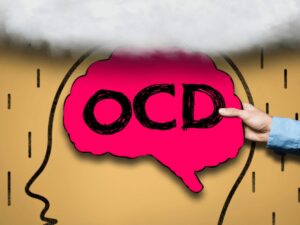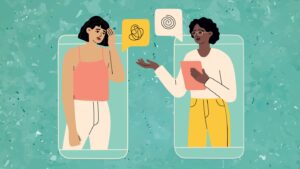If you’re living with Obsessive Compulsive Disorder (OCD) or depression, it can be scary and overwhelming to seek help. You might not know where to start or who to turn to for assistance. But you don’t have to suffer alone—there are therapists near you that specialize in assisting individuals with OCD and depression. In this article, we’ll discuss the importance of seeking out an OCD and depression therapist and how to find one near you. We’ll also take a look at some of the treatment options available so you can make an informed decision when it comes to your mental health care.
Contents
What is OCD?

Obsessive-Compulsive Disorder, or OCD, is a mental disorder in which people have unwanted and repeated thoughts, feelings, images, and sensations (obsessions) that drive them to do something over and over again (compulsions).
OCD is a type of anxiety disorder. Anxiety is the main symptom of OCD. People with OCD may be plagued by persistent, unwelcome thoughts or images that are intrusive and cause distress or anxiety. These may be ideas that they know are not true but cannot get out of their minds (obsessions). To try to control their obsessions and anxiety, they feel they must do certain rituals or routines (compulsions). These rituals can take up a lot of time and get in the way of daily life.
Most people with OCD realize that their obsessions are not rational, but they cannot stop them. They may feel ashamed or embarrassed about their symptoms, which can make it hard to talk about them with others.
What is Depression?
Depression is a mood disorder that causes a persistent feeling of sadness and loss of interest. It affects how you feel, think, and behave and can lead to a variety of emotional and physical problems.
You may have trouble doing normal day-to-day activities, and sometimes you may feel as if life isn’t worth living.
Depression is one of the most common mental disorders, affecting millions of people around the world. It often begins in adolescence or young adulthood but can occur at any age.
There are different types of depression, including major depressive disorder, dysthymic disorder, and seasonal affective disorder. While there are many similarities among these types of depression, there are also some important differences.
The Link Between OCD and Depression
It is not uncommon for people with OCD to also suffer from depression. Studies have shown that people with OCD are more likely to suffer from depression than the general population. The link between OCD and depression is thought to be because both disorders share certain risk factors, such as a family history of mental illness, low self-esteem, and perfectionism.
People with OCD often obsess about things that they perceive as being out of their control. This can lead to feelings of helplessness and despair, which can trigger or worsen depressive symptoms. Additionally, the compulsions associated with OCD can take up a lot of time and energy, leaving little room for activities that bring joy or pleasure. This can also contribute to feelings of depression.
If you are struggling with both OCD and depression, it is important to seek treatment from a mental health professional who specializes in treating both disorders. Treatment for OCD typically includes exposure and response prevention (ERP) therapy, which helps people learn to manage their obsessions and compulsions healthily. Treatment for depression may include medication, talk therapy, or a combination of both.
Different OCD and Depression Therapists

There are many different types of OCD and Depression therapists. Some specialize in one type of therapy, while others may offer a more holistic approach. It’s important to find a therapist that you feel comfortable with and who has experience treating your specific condition.
These are some of the types of therapists who specialize in treating OCD and Depression:
Psychiatrist
One of the main types of OCD and depression therapists is a psychiatrist. Psychiatrists are medical doctors who specialize in diagnosing and treating mental health disorders. They can prescribe medications to help manage symptoms like anxiety, depression, and obsessive-compulsive behaviors. Some psychiatrists specialize specifically in treating OCD and Depression.
Psychologist
A psychologist is a mental health professional who has specialized training in cognitive-behavioral therapy (CBT). CBT is an evidence-based form of talk therapy that helps people identify and address the thoughts, feelings, and behaviors that are contributing to their OCD or depression. They can also provide guidance and support as you work through the challenges of managing your condition.
Social Worker
A social worker is a mental health professional who specializes in helping people manage their emotional and behavioral issues. They can provide counseling, therapy, and other types of support to help people manage their OCD or depression. In addition, they may offer help with practical issues like housing, financial aid, and job search assistance.
Clinical Nurse Specialist
A clinical nurse specialist is a mental health professional who specializes in treating OCD and depression. They have advanced training in diagnosing and treating mental health conditions, as well as additional knowledge of physical health care. In addition to providing therapy and counseling, they can provide support to families and patients as they cope with the challenges of managing their condition.
Substance Abuse Counselor
A substance abuse counselor is a mental health professional who specializes in helping people manage addictions or substance use disorders. They can provide counseling, therapy, and other forms of support to those struggling with OCD or depression. Substance abuse counselors can also offer advice and guidance on how to manage triggers for OCD or depression.
No matter which type of therapist you choose, it is important to remember that effective treatment for your OCD and depression requires patience, dedication, and commitment. Treatment will be most successful if you are willing to take an active role in managing your condition.
How to Find an OCD and Depression Therapist Near Me?
If you or someone you know is struggling with OCD and depression, it’s important to seek professional help. A therapist who specializes in treating these disorders can provide the necessary support and guidance to help manage symptoms and improve quality of life.
There are a few different ways to find an OCD and depression therapist near you. You can ask your primary care doctor for a referral, search online directories, or look for mental health providers in your insurance network.
Once you’ve compiled a list of potential therapists, it’s important to do your research to find someone who is a good fit for you. When looking at therapist profiles, pay attention to their experience treating OCD and depression, as well as their approach to treatment. It’s also helpful to read reviews from past patients to get an idea of what others’ experiences have been like.
Once you’ve found a few therapists you’re interested in working with, reach out to them directly to see if they offer a free consultation. This allows you to meet with the therapist and get a feel for their personality and approach before committing to treatment.
Benefits of Visiting an OCD and Depression Therapist Near Me

There are many benefits to visiting an OCD and depression therapist near you. Working with a professional can help you better understand your condition, identify triggers, and develop strategies for managing symptoms. A therapist can also guide you as you navigate the challenges of living with these conditions.
In addition, having someone knowledgeable in both mental health and physical health care can be beneficial. Many physical health issues can be related to mental health conditions, and a therapist who understands this connection can provide more comprehensive treatment.
Finally, having someone nearby who you can turn to for support and guidance when needed can be invaluable. It’s important to have access to a trained professional who understands your specific situation and knows how to help you manage it effectively. Finding an OCD and depression therapist near you is the first step in taking control of your mental health. With the right support, you can find relief from your symptoms and learn effective strategies for managing your condition.
Conclusion
If you are experiencing signs and symptoms of OCD and depression, it is important to seek help from a qualified mental health professional. Finding the right therapist for your needs can be a challenge, so we have provided some tips on how to find an appropriate OCD and depression therapist near you. Once you have found the right person who meets all of your requirements, be sure to take advantage of their services to get the most out of your therapy sessions. We wish you luck on this journey toward healing!
For more information and guidance, please contact OCDMantra. OCD is a mental health disorder characterized by obsessions and compulsions. If you have any queries regarding OCD treatment, ERP therapy experienced therapists at OCDMantra can help: Book a trial OCD therapy session. We provide effective online depression counseling.


